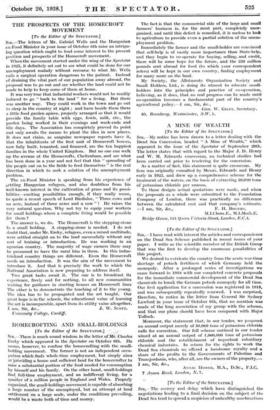HOMECROFTING AND SMALL-HOLDINGS [To the Editor of the SPECTATOR.] -
Sia,—There is much sound wisdom in the letter of Mr. Charles Ereky which appeared in the Spectator on October 6th, Ile seems, however, to confuse the homecrofting with the small- holding movement. The former is not an independent occu- pation which finds whole4ime employment, but simply aims at VrOviding a houSe and sufficient land for the homecrofter to raise a substantial portion of the food needed for consumption by himself and his family, On the other hand, small-holdings find .full-time employment, and an indifferent living, for a qualter of a million people in England and Wales. Properly Organized, the Fonll-holdingss "mOvement,is capable of absorbing a large number of the unemployed, but an attempt at land settlement on a -large scale, under the conditions prevailing, would be a waste both of time and money.
The fact is that the commercial side of the large and small farmers' business is, for the most part, completely unor- ganized, and until this defect is remedied, it is useless to look to agriculture to provide even a partial solution of the unem- ployment problem.
Immediately the farmer and the small-holder are convinced that self-help is of vastly more importance than State-help, and they begin to co-operate for buying, selling, and credit, there will be some hope for the future, and the 250 million pounds sent abroad for food (to which your correspondent refers) will be kept in our own country, finding employment for many more on the land.
My Society, the Allotments Organization Society and Small Holders, Ltd., is doing its utmost to educate small- holders into the principles and practice of co-operation, believing, as it does, that no real progress can be made until co-operation becomes a fundamental part of the country's agricultural policy.—I am, Sir, &c.,
GEO. W. GILES, Secretary. 40, Broadway, Westminster, S.W,1.






























































 Previous page
Previous page